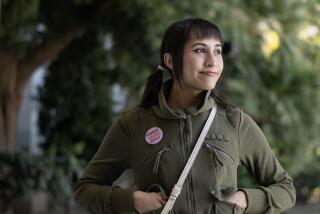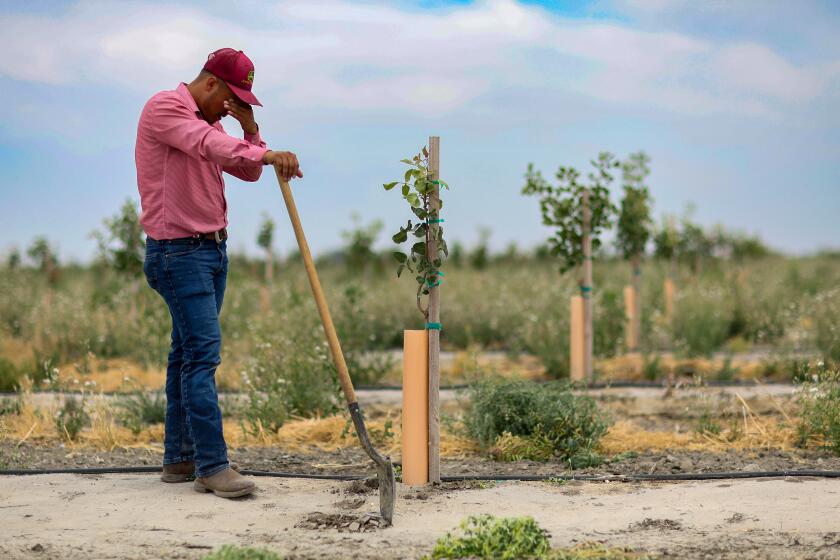Irate Kin of Disabled Latino Children Picket Service Center : Protest: Families say African-American staff has been insensitive to needs. Center director blames budget cut.
In a sign of the shifting demographics of South-Central Los Angeles, an angry group of Latino families with disabled children picketed a local social service center Thursday, contending that the predominantly African-American staff has been insensitive to their needs.
About two dozen protesters, some holding signs in Spanish reading “Hispanics United Will Overcome,” marched in front of the South Central Los Angeles Regional Center for Developmentally Disabled Persons in a call for more bilingual case workers and Latino managers at the private, state-funded facility.
The night before, more than 200 activists descended on a public meeting of the center’s board of directors, precipitating a heated shouting match that included allegations of embezzlement and ultimately led directors to cancel the meeting and call the Fire Department to clear the room.
“We’re charging these people with a reverse form of racism,” said Armando Soto Mayor, a spokesman for the protesters, who has two disabled sisters. “They’re treating us like they used to be treated. We want recognition and respect.”
The center’s executive director, Dexter Henderson, said he sympathizes with the concerns of the protesters and is committed to hiring more Spanish-speaking staff. But Henderson, who is black, said some problems are an inevitable result of cutting $1.5 million from his $34.5-million budget, which has required caseworkers to take on larger loads.
“We’re fighting among ourselves for the little crumbs left over, as opposed to focusing on the real establishment that caused it to be like this in the first place,” he said. “That’s what’s so terrible about all this.”
Henderson also acknowledged that checks had been stolen from the center’s office and confirmed that one for $68,000 had been cashed. But he added that the bank has restored the money to the center’s account and that an investigation into the incident is ongoing.
“Frankly, I think there’s a few individuals who would prefer to see a confrontation and chaos occur, rather than sitting down and discussing the real issues at hand,” said Henderson, who has headed the agency since 1987.
But one of three Latinos on the center’s 15-member board of directors said Thursday that he believes cultural misunderstandings are causing real problems between the African-American management and their Spanish-speaking clients.
“They treat these people with arrogance and it hurts me,” said Jerry Mosqueda, who was appointed four months ago. “These are the same people who not too long ago were asking us for support in their struggle for equality and fairness. Now they have Alzheimer’s as soon as they get to that point of power.”
The South Central Los Angeles Regional Center is one of 21 nonprofit facilities throughout California that contract with the state Department of Developmental Services to provide help for about 83,000 disabled people.
The South Central center, however, covers a wide and demographically shifting swath of the county, where immigration in the last decade has brought the Latino population nearly equal to what had been a black majority. The 1990 U.S. Census shows that about 122,000 blacks live in South-Central Los Angeles, down 17% since 1980. There are about 115,000 Latinos, up 119% from 10 years ago.
Henderson said he has tried to keep pace with those changes but has been frustrated by what he said is the difficulty in recruiting qualified bilingual staff. He said 20 of the 50 caseworkers assigned to home-care clients are Spanish speakers, although not all of them are Latinos. He also acknowledged that his five department heads are black, but said most of them are career administrators who have worked their way up at the agency over the last 15 years.
However, with Latinos now making up about 35% to 40% of the center’s 5,000 clients, those demonstrating for better care said they have grown impatient.
As she pushed her 17-year-old son, Jesus, in his wheelchair in front of the center’s barred windows on West Adams Boulevard, Elvira Ruiz complained of rude secretaries, indifferent caseworkers and a general sense that no one is willing to listen to her concerns.
“It’s because we speak Spanish,” she said. “They get away with it because they know we can’t communicate 100%.”
More to Read
Sign up for Essential California
The most important California stories and recommendations in your inbox every morning.
You may occasionally receive promotional content from the Los Angeles Times.






